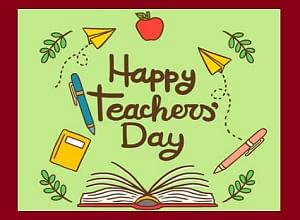
teachers
Education is the key to everything constructive. Right from the beginning when we were told -- how to hold a pencil and from how to recite a,b,c, d also when we are asked to greet everyone with respect is a part of education.
Education is an ongoing process it never ends, it will be with you until your last breath.
But who helped us to impart that education our parents and our teachers.
Today September 5 is celebrated as a teacher’s day. It is a special day when we can thank our mentors for their contribution towards building up our knowledge and tutoring us with every special learning.
But why we celebrate teachers’ day? Today is the birth anniversary of the great philosopher, Sarvepalli Radhakrishnan, who was the first vice president and second president of India.
Radhakrishnan was a distinguished scholar of comparative religion and philosophy. His philosophy was based on the reinterpreting the tradition for a contemporary understanding – Advaita Vedanta.
Dr Radhakrishnan has given 40 years of his life to education.
He believed that the education can transform the world.
He believed that “instead of celebrating my birthday, it would be my proud privilege if September 5 is observed as teachers’ day”
Here are few of the teachings which we can recall today to keep that ‘education’ alive:
- Books are the means by which we build bridges between cultures.
- Teachers should be the best minds in the country.
- A literary genius, it is said, resembles all, through no one resembles him.
- A life of joy and happiness is possible only on the basis of knowledge and science.
- When we think we know, we cease to learn.
- The end-product of education should be a free creative man, who can battle against historical circumstances and adversities of nature.
- The main function of a university is not to grant degrees and diplomas, but to develop the university spirit and advance learning. The former is impossible without corporate life, the latter without honours and post-graduate.
- True teachers are those who help us think for ourselves.
Today what we are and we can be is dependent upon education especially because of the teachers who have imparted their knowledge to us to shape our future and made present better, as he once said anubhavāvasānameva vidyā phalam. The fruit of knowledge is the fruit of education which comes from experience.









